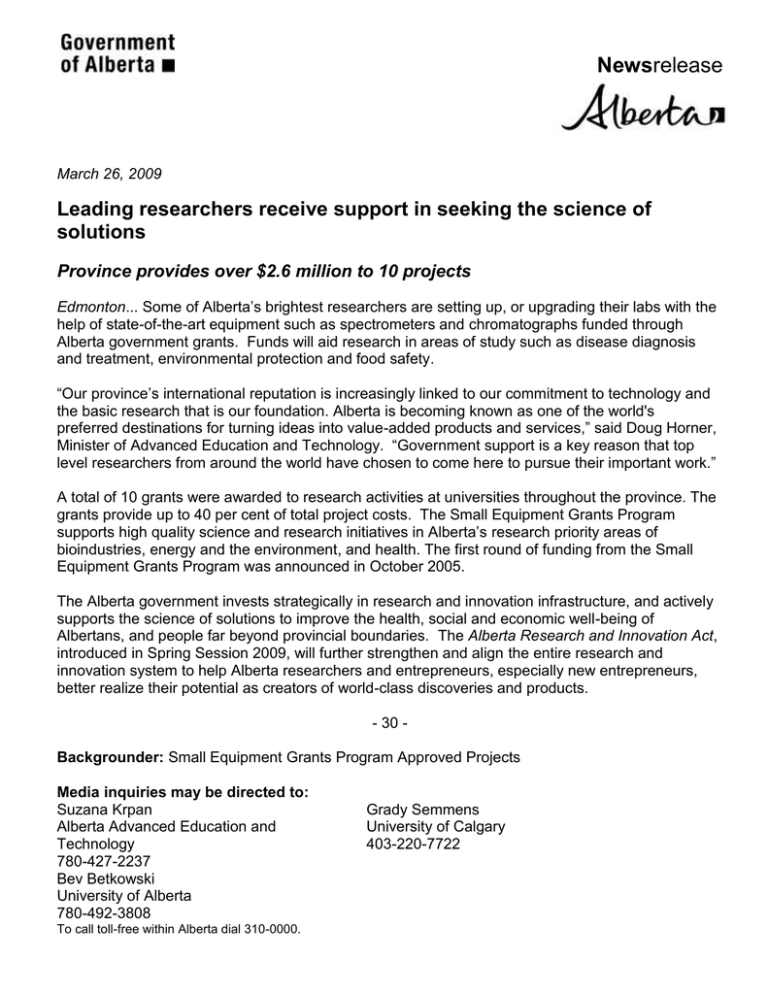News Leading researchers receive support in seeking the science of solutions
advertisement

Newsrelease March 26, 2009 Leading researchers receive support in seeking the science of solutions Province provides over $2.6 million to 10 projects Edmonton... Some of Alberta’s brightest researchers are setting up, or upgrading their labs with the help of state-of-the-art equipment such as spectrometers and chromatographs funded through Alberta government grants. Funds will aid research in areas of study such as disease diagnosis and treatment, environmental protection and food safety. “Our province’s international reputation is increasingly linked to our commitment to technology and the basic research that is our foundation. Alberta is becoming known as one of the world's preferred destinations for turning ideas into value-added products and services,” said Doug Horner, Minister of Advanced Education and Technology. “Government support is a key reason that top level researchers from around the world have chosen to come here to pursue their important work.” A total of 10 grants were awarded to research activities at universities throughout the province. The grants provide up to 40 per cent of total project costs. The Small Equipment Grants Program supports high quality science and research initiatives in Alberta’s research priority areas of bioindustries, energy and the environment, and health. The first round of funding from the Small Equipment Grants Program was announced in October 2005. The Alberta government invests strategically in research and innovation infrastructure, and actively supports the science of solutions to improve the health, social and economic well-being of Albertans, and people far beyond provincial boundaries. The Alberta Research and Innovation Act, introduced in Spring Session 2009, will further strengthen and align the entire research and innovation system to help Alberta researchers and entrepreneurs, especially new entrepreneurs, better realize their potential as creators of world-class discoveries and products. - 30 Backgrounder: Small Equipment Grants Program Approved Projects Media inquiries may be directed to: Suzana Krpan Alberta Advanced Education and Technology 780-427-2237 Bev Betkowski University of Alberta 780-492-3808 To call toll-free within Alberta dial 310-0000. Grady Semmens University of Calgary 403-220-7722 Backgrounder March 26, 2009 Support for Alberta’s researchers through the Small Equipment Grants Program Edmonton... The March 2008 Small Equipment Grants Program competitions received 11 applications. The following 10 projects share more than $2.6 million in total funding from the Department of Advanced Education and Technology: Organization Project Outline SEGP Award Dr. Gordon Chua University of Calgary Total Project Cost $1,186,860 Dr. Prasanth Chelikani University of Calgary Total Project Cost $1,140,695 Dr. Richard Fahlman University of Alberta Total Project Cost $984,205 Dr. Chang-Chun Ling University of Calgary Total Project Cost $877,460 Functional Genomics Laboratory for deciphering generegulatory and genetic-interaction networks – This award will help equip a laboratory for functional genomics which includes an SGA (synthetic genetic array) suite and a microarray suite. With these tools, Dr. Chua aims to uncover and better understand the genetic origin of many human diseases. Obesity Research Laboratory – Equipment purchased will further the study of the role of gastrointestinal signals in regulating food intake, which aims to better understand the complex nature of obesity and the physiological mechanisms that play a key role in obesity in both humans and animals. Dr. Chelikani’s laboratory will be a powerful tool in designing future programs for the treatment and prevention of obesity. Post-translational modifications and the proteome during Apoptosis The funding for purchase of a high definition mass spectrometer system will further the understanding of Multiple Myeloma, a form of cancer of the plasma cells. The research aims to generate insight into cancers that appear to be resistant to conventional treatments. This research may lead to the discovery of more effective treatments for these cancers. A microbiological culture and biochemistry laboratory for carbohydrate research - The award supports exploring a novel approach to the treatment of cancer and other infectious diseases that combines the areas of organic chemistry and microbiology. This research has the potential to impact the area of vaccination and the treatment of cancer and infectious diseases through the study of the interaction between carbohydrates and proteins, which plays a role in conditions such as cancer, viruses, autoimmune diseases and inflammation. $ 474,745 $ 456,278 $ 393,682 $ 350,983 Dr. David Eaton University of Calgary Total Project Cost $808,090 Dr. Sergei Noskov University of Calgary Total Project Cost $756,419 Laboratory for passive seismic imaging of earth processes This award is to develop a laboratory for passive seismic imaging of the earth’s processes which will use naturally occurring mini earthquakes as a source of seismic waves instead of artificial methods such as dynamite or air guns. Equipping this laboratory offers the opportunity to advance a wide range of areas including earthquake hazard analysis, CO2 capture and storage, oil recovery efficiency and the earth’s physical evolution. Laboratory for computational structural biology: Theoretical gateway to molecular origins of selective ligand binding to membrane proteins - This award will help develop a greater understanding of how proteins on the cell surface or on a membrane within a cell bind to other molecules, which may become a powerful tool for advancing the effectiveness of therapeutic drugs and may provide insight into new methods of drug delivery. $ 303,236 $ 194,352 Dr. Roger Zemp University of Alberta Total Project Cost $373,981 Drs. Jianping Wu, Mirko Betti, and Robert Renema University of Alberta Total Project Cost $341,182 Quantitative photoacoustic imaging technology development - The award will assist in developing a new molecular imaging technology to generate images, such as the amount of oxygen that a body tissue uses, to monitor the development of diseases such as cancer and heart disease, as diseased tissue uses less oxygen than healthy tissue. Development of a comprehensive platform for the valueadded utilization of poultry products – The funding to complement the value- added poultry program at the University of Alberta. Some of Dr. Wu’s research projects include an egg biorefinery which intends to develop ways to make use of all parts of the egg from the shell to the yolk. A value-added meat program is also incorporated into this award, and will attempt to determine way s to increase the nutritional value of poultry and overall efficiency of the poultry industry. These initiatives will assist in strengthening Alberta’s agriculture industry and may develop products which will increase the health of Albertans. $ 135,000 $ 120,000 Dr. Christian Haas University of Alberta Total Project Cost $401,250 Dr. William Allison University of Alberta Total Project Cost $206,265 Airborne electromagnetic sea ice thickness sensor – Acquiring this equipment will improve the ability to accurately measure and monitor ice thickness changes, providing valuable insight into how sea ice levels may indicate changes in the climate. A transgenic zebrafish facility to study prion proteins, neurodegenerative disease and photoreceptor regeneration the award will advance the study of prion function and retinal degenerative disease as Zebrafish share similar genetic material with mammals and are useful models for studying human diseases. Such research will potentially assist in the detection and treatment of BSE, CWD, Creutzfeldt-Jakob disease and retinal degenerative diseases such as macular degeneration. $ 100,000 $ 81,050 What is the Small Equipment Grants Program? The Small Equipment Grants Program supports science and research initiatives of strategic importance to Alberta by funding research equipment and new labs. Proposals may include requests for research infrastructure (e.g. equipment, specimens, databases etc.), that are considered essential to the project. The Program provides up to 40 per cent of the total eligible project costs for each successful proposal. Applications to the Small Equipment Grants Program are assessed by external peer reviewers and an expert scientific review panel to ensure research excellence and the alignment of the project with Alberta’s strategic research priorities. More information on eligibility and operating guidelines of the Small Equipment Grants Program is available on the Advanced Education and Technology website. - 30 - Media inquiries may be directed to: Suzana Krpan Alberta Advanced Education and Technology 780-427-2237 Bev Betkowski University of Alberta 780-492-3808 To call toll-free within Alberta dial 310-0000. Grady Semmens University of Calgary 403-220-7722

